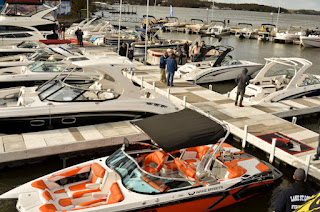Fire Loss is Preventable
The Law
Accidental or not, under Federal law (the Oil Pollution Act and the Clean Water Act), it is illegal to discharge any amount of fuel, oil or other petroleum product into the waters of the United States.
By law, any oil or fuel spill that leaves a sheen on the water must be reported to the U.S. Coast Guard National Response Center by calling 1-800-424-8802. Many states require you to contact them as well in case of a spill so make sure you know what agency to contact in your state.
It is also against the law to use detergents, soaps, emulsifying agents or other chemicals to disperse a spill. These products cause the petroleum to sink, creating even greater environmental damage. While it may only seem like a small amount, it can permanently contaminate bottom sediments. Anyone who deliberately applies soap to disperse or hide a sheen is subject to criminal penalties and high fines.
To increase awareness of the issue, boats 26' and longer are required to post an oil placard (available at marine supply stores) near the engine.
After fueling and before starting your engine, run your blower for at least 3 - 5 minutes, this will exhaust any fuel fumes trapped in the bilge /engine compartment. Also open the engine hatch while running the blower, this will help air out the bilge /engine compartment. I like to do a sniff test for any odor of fuel.
Something to consider, it is not bad practice to run your blower each time before starting your engine. On a hot summer day, the fuel fumes / vapors can still build in the bilge /engine compartment. So before leaving the on the water bar, a few extra minutes will save you a life time of regret.
Engine Electrical
Wiring harnesses and starters cause a disproportionate number of fires on boats more than 25 years old. If you have a vintage boat and those parts are original, consider replacing them. Most of these older boats had relatively simple wiring harnesses, so if the manufacturer is no longer in business, or the part is no longer available, a good electrical technician can put one together for you.
Other DC Electrical
While loose battery connections, chafed battery cables, and aged battery switches can all cause fires aboard, the most common cause of battery-related fires is operator error: reversing the battery cables or connecting them in series when they should have been in parallel, or vice versa. If you're disconnecting your batteries for any reason, photograph the configuration with your phone first, label the battery cables, and mark the positive lug with red fingernail polish to make sure you avoid a shocking experience when you reconnect them.
AC Electrical
Other Engine
Batteries
On older outboards, the voltage regulator is by far the most common cause of fires. The failure rate increases with age after 10 years, so if your outboard is 15 years old or more, replacing the regulator may well keep you from having a bad day on the water.




Comments
Post a Comment